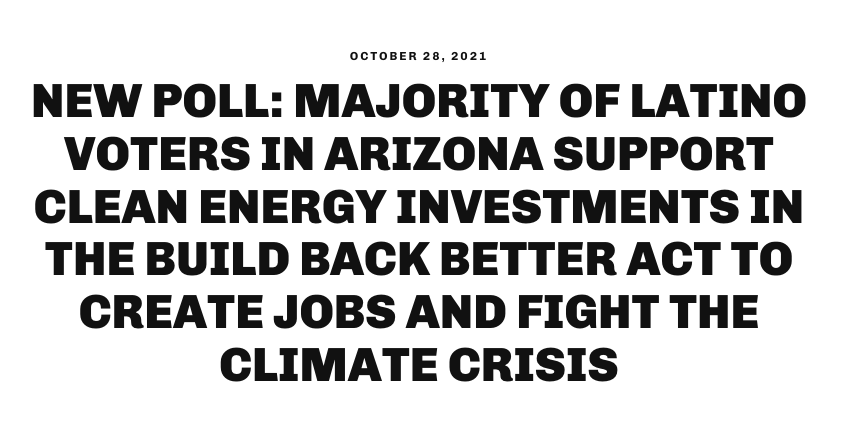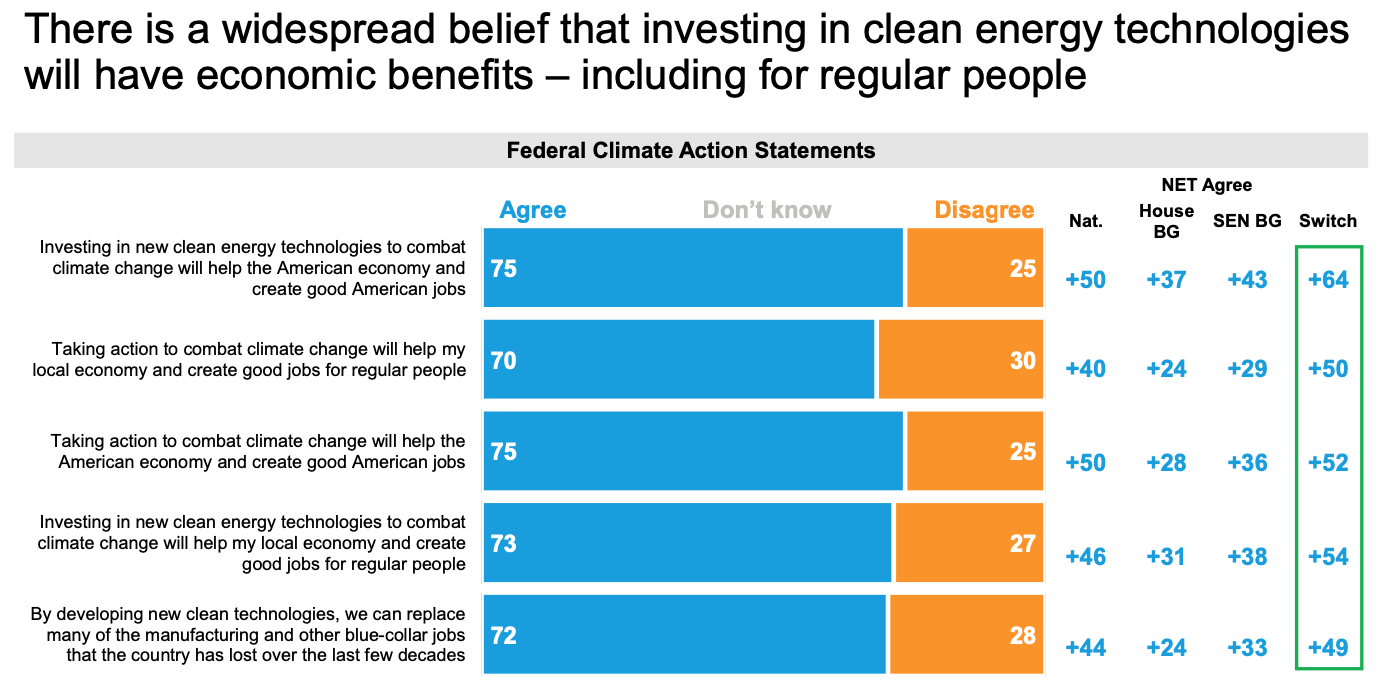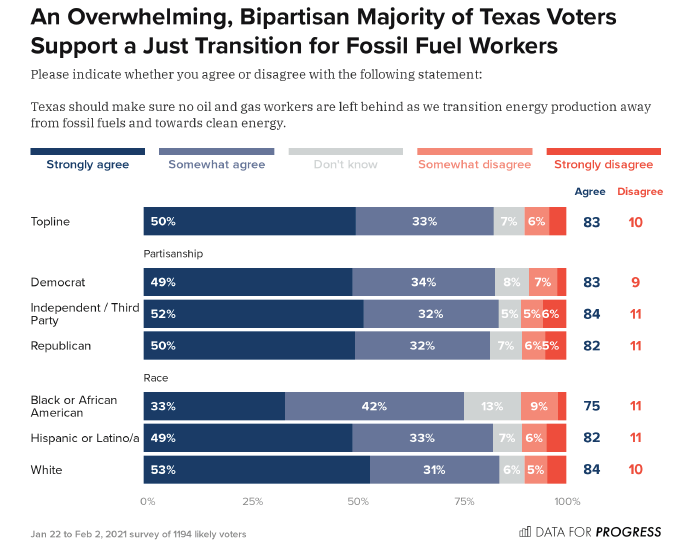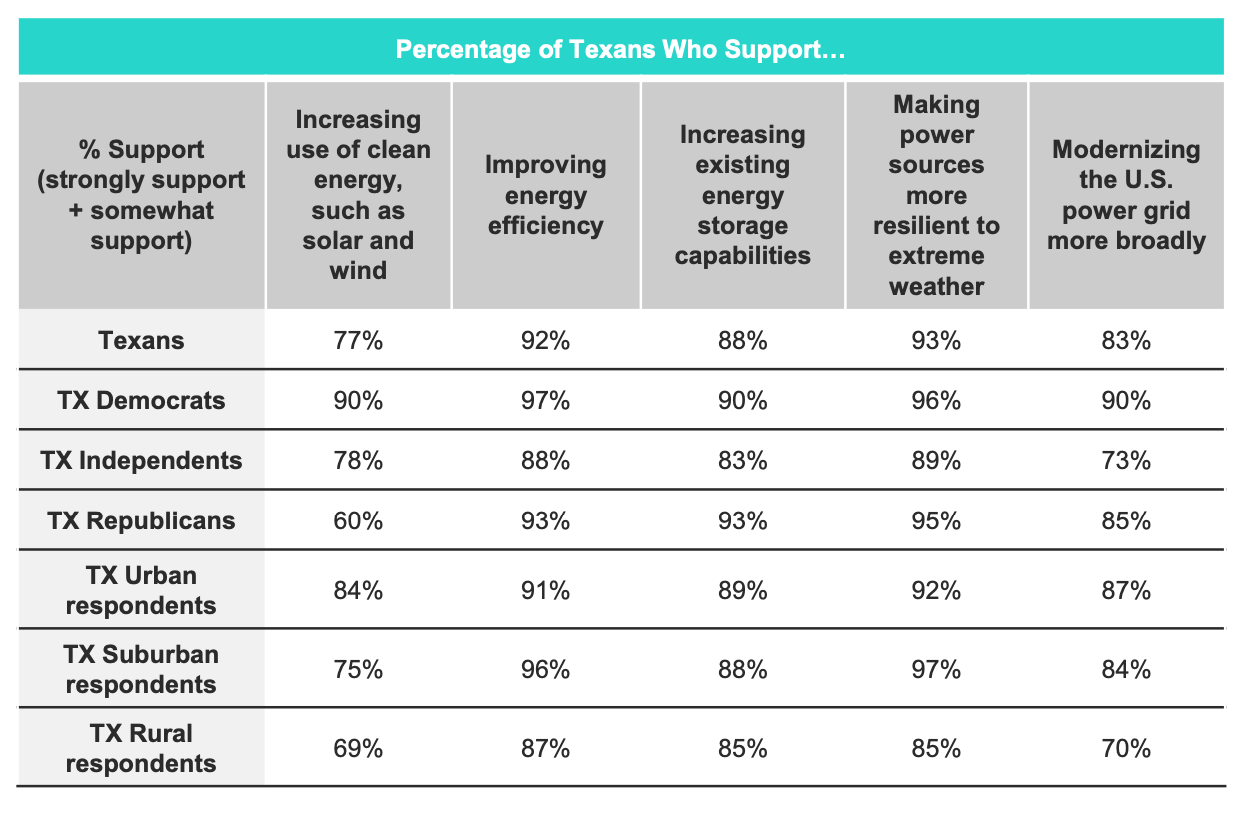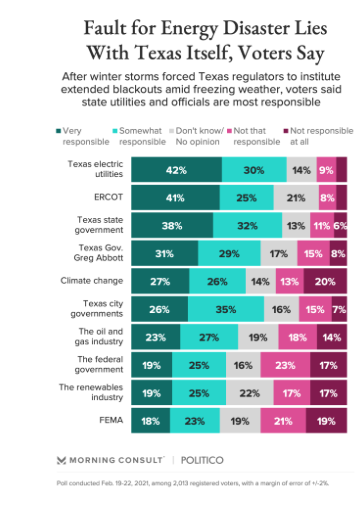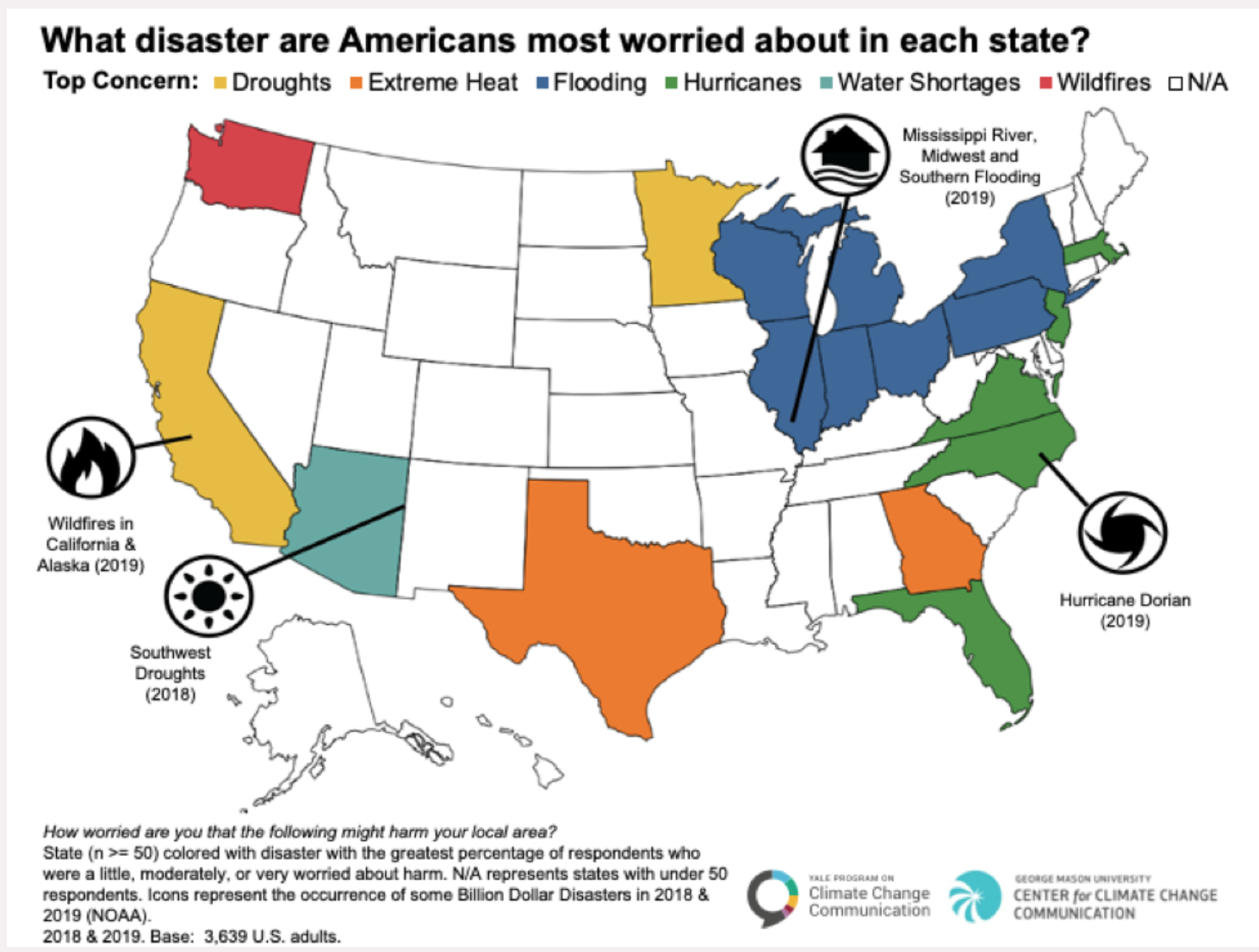Resources
Search below for resources covering the intersection of climate engagement, social science and data analytics.
RESULTS
Environmental Polling Roundup - February 25th, 2022
This post includes climate and environment headlines, data points, and key takeaways from recent public polls - including a new messaging experiment to determine the most persuasive ways to talk about clean energy costs, findings from Yale’s latest mapping of climate change attitudes across the country, new polling on corporate accountability, and a new poll on Texas voters’ attitudes about climate and clean energy a year after the Texas Freeze.
Environmental Polling Roundup - November 5th, 2021
This post includes a roundup of climate + environment headlines, data points, and key takeaways from this week’s public polls - including fresh polling on the new Build Back Better framework and its core climate and energy provisions + analysis of climate polling trends throughout the year + new polling on attitudes about climate and clean energy among Latino voters in battleground states and districts.
Latino voters in battleground states and districts overwhelmingly support the Build Back Better plan’s climate and clean energy provisions. All of the 11 Build Back Better provisions tested in the poll have overwhelming support (76%+), and several climate and clean energy provisions rank among the most popular elements of the bill whether looking at overall net support or intensity (“strong support”). Particularly appealing provisions include: lowering energy costs by making homes, schools, buildings, and vehicles more energy efficient (89% total support, including 55% strong support); creating millions of additional clean energy jobs in fast-growing industries like wind and solar (87% total support, including 52% strong support); making oil and gas companies pay their fair share for the pollution they create (86% total support, including 55% strong support); providing tax incentives to make clean energy sources like wind and solar power widely available at lower costs (86% total support, including 51% strong support; rewarding electric utilities that generate more electricity from clean energy sources like wind and solar (85% total support, including 50% strong support). (The poll sampled Latino voters statewide in Arizona, Colorado, Florida, and Nevada, as well as Latino voters in competitive U.S. House districts in California and Texas).
Youth Autonomous Organizing
A collection of interviews, articles, short essays and art - a zine made by youth and community organizers in the Greater Southwest.
Poll: Investing in American Clean Energy to Build the Industries of the Future
Key findings of a survey (phone and online) of US voters, with oversamples in key states include:
- Voters across the political spectrum overwhelmingly support government investments in clean energy technologies in order to rebuild the economy (77%), create good jobs (76%), and eliminate the carbon emissions that cause climate change (75%).
- There's a widespread belief (75%) that investing in clean energy technologies will have economic benefits – including for "regular people."
- And also that by developing new clean technologies, we can replace many of the manufacturing and other blue-collar jobs that the country has lost over the last few decades (72%)
- Strong support for various approaches to boost and develop specific clean energy technologies such as clean steel and cement, clean jet fuels, and energy storage and transmission.
- Voters support investing $75 billion in clean energy tech RD&D as part of the upcoming infrastructure bill.
Poll: After Historic Outages, Texans Favor Solar, Wind and Other Clean Energy
Polling research shows that after historic power outages in February 2021, most Texans are in favor of the state producing more renewable energy and reducing their dependency on fossil fuels.
- About six in 10 Texas voters say that the state should add solar (65%) and wind (58%) energy resources. There was less support for natural gas (45%), nuclear (28%), and coal (20%).
- 30% of Texas voters strongly agree and 26% somewhat agree that the primary goal of Texas’ energy policy should be achieving 100% clean power.
- 45% of Texas voters strongly agree and 32% somewhat agree that being a leader in clean energy innovation is important to Texas’s future.
Poll: Texas Voters Want to Transition to Clean Energy
A statewide survey to assess the attitudes of likely Texas voters (including an oversample of Latino voters) toward climate change, pollution, and transitioning to clean energy revealed key insights, including:
- Across party lines, voters are overwhelmingly concerned (85%) about air and water pollution.
- 67% are concerned about climate change, with Latino (82%) and Black (80%) voters expressing the highest levels of concern.
- Voters also agree (61%) that there is still time to come together as a state and country to take the actions that are necessary to address climate change and leave a better world for generations to come. Agreement is highest (72%) among Latino voters.
- A strong majority (59%) also would like to see their leaders support clean energy industries to reduce carbon emissions and ensure Texas remains America’s energy leader, with support highest among Black (77%) and Latino (66%) voters.
- A message that resonates across party lines is that Texas can face tough problems and can leverage its status as a national and global energy leader to become a champion of a new global energy economy.
- 83% agree that Texas should make sure no oil and gas workers are left behind as America transitions away from fossil fuels and toward clean energy.
-
A majority also think it is “Very important” or “Somewhat important” to include proposals for job training (89% important), new jobs in clean energy (87% important), pensions for retired workers (85% important), financial assistance for new degrees or trade certifications (83%), and buyouts for workers within five years of retirement (78%) in this transition bill.
-
Texas voters also support closing the revolving door of government officials becoming lobbyists for the fossil fuel industry, with a majority of Texans across parties (52%) supporting a proposal that would prevent former lawmakers from becoming lobbyists for the oil and gas industry immediately after leaving office.
Poll: Texans’ Opinions on Recent Extreme Cold
Survey of 500 Texans in the immediate aftermath of the extreme cold weather and resulting power outages found:
- Respondents expressed concern about extreme cold (78%), power outages caused by weather events (83%), and access to clean drinking water (76%). Concern spanned community types, and was highest (80%) among rural respondents.
- 79% say it should be a priority for the U.S. to pass legislation to address climate change
- Majorities across Texas support a wide range of legislative measures to prevent future power outages, including: increasing use of clean energy (77%), improving energy efficiency (92%), increasing existing energy storage capabilities (88%), making power sources more resilient to extreme weater (93%), and modernizing the U.S. power grid more broadly (83%).
- 56% of U.S. voters say Texas should connect its electric grid with those of other regions, while 24% said the state should continue its independent operation.
- Roughly 2 in 5 voters say Texas utilities, the state’s energy regulator and state government are “very responsible” for last week’s energy crisis.
- Democrats were more likely to say they believe Texas should connect to other regions than retain its current model (71% to 13%), while a plurality of Republicans said the same (41% to 36%).
How does the American public perceive climate disasters?
Different parts of the country see various kinds of extreme weather as most concerning, perceptions which are largely in line with actual major disasters that have occurred in those regions. This report provides concern profiles for the 18 largest states, drawing on survey data from 2018 and 2019. Over half of Americans see such extreme weather events posting a high or moderate risk to their community in the coming decade, and two thirds see a climate link to US weather (though only a third think climate affects our weather "a lot").
Pagination
- Previous page
- Page 2
- Next page
